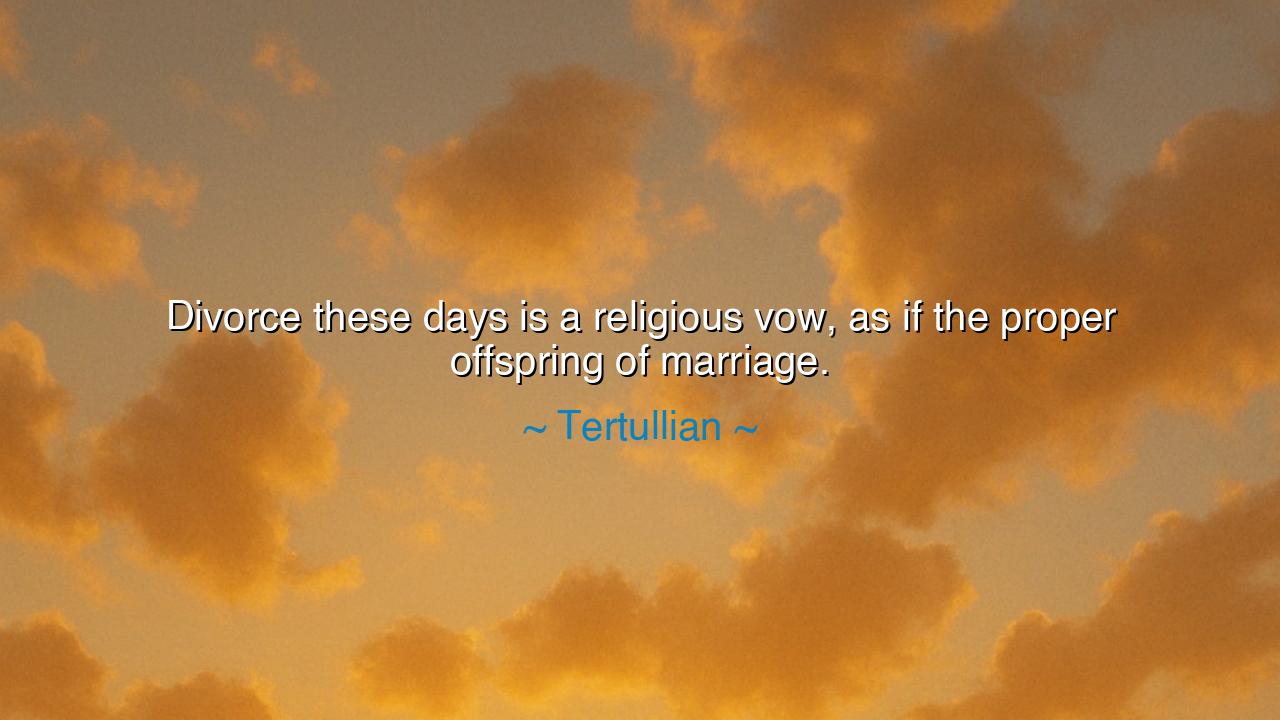
Divorce these days is a religious vow, as if the proper offspring






O Children of the Future, listen to the profound words of Tertullian, a voice from the ancient past who, in his wisdom, offers a somber reflection on the nature of divorce in his time. He declares, "Divorce these days is a religious vow, as if the proper offspring of marriage." With this statement, Tertullian critiques the growing acceptance of divorce, suggesting that it has become so common that it is almost as if it were a rite—an inherent and accepted consequence of marriage. In his view, the sacred bond of marriage, which was once a sacred and unbreakable vow, had deteriorated into a contractual obligation that could easily be undone when convenience or dissatisfaction arose.
In the ancient world, O Children, marriage was not just a personal matter but a sacred institution—one that was sanctified by the gods and woven deeply into the fabric of society. The Romans viewed marriage as essential to the stability of their civilization, and though it was not without its imperfections, it was generally seen as a bond that should not be easily broken. Tertullian, as a Christian apologist, came from a society that was beginning to witness a shift in the perception of marriage and divorce. In his day, the practice of dissolving marriages was increasingly common, and he saw this as a sign of moral decay. To him, the ease with which people were ending their marriages was a reflection of society's failure to uphold the sacredness of the vow they had made to one another.
Consider, O Children, the early Christian teachings on marriage. Jesus himself, in the Gospel of Matthew, spoke against divorce, saying, “What therefore God has joined together, let no man separate.” This call to permanence in marriage was a radical departure from the Roman practice, where divorce could be initiated by either party, often for trivial reasons. In the ancient world, marriage was not just about love and companionship but about the continuation of the family and the maintenance of societal order. Tertullian, influenced by these Christian teachings, viewed divorce as a grave offense, an act that undermined the very purpose of marriage—to be a lifelong commitment and a bond that reflected the eternal love between God and His people.
The story of Emperor Augustus, the first Roman emperor, provides an example of the complexities of marriage and divorce in the ancient world. Though Augustus promoted the institution of marriage through laws designed to encourage moral and familial stability, he himself was embroiled in a series of marital unions and divorces, the most notable being his decision to divorce his wife Claudia for failing to produce children and marry Livia Drusilla, whom he had been involved with for years. Augustus’ actions reveal the tension between political and personal interests in marriage, and how the institution could be manipulated for personal or political gain. This stands in stark contrast to Tertullian's belief that marriage should be something sacred, a bond that should not be dissolved lightly.
Tertullian’s sharp critique of divorce as a "religious vow" points to the moral implications of divorce becoming so commonplace that it was almost considered a normal consequence of marriage. In his eyes, this shift in societal attitudes toward marriage and divorce represented a deeper erosion of moral values—values that could be traced back to the sacred vows taken before God and community. By making divorce as easily accepted as a religious vow, society had, in Tertullian’s view, undermined the very sanctity of marriage, turning it from an unbreakable bond into just another contract that could be undone when no longer convenient.
The lesson, O Children, is this: marriage is not merely a societal contract nor a fleeting relationship—it is a sacred bond that requires commitment, sacrifice, and perseverance. Divorce, while at times a necessary step to free individuals from toxic or harmful unions, should not be viewed as the natural end of every marriage. It is important to understand that the vows of marriage should not be taken lightly; they are a promise not only to one another but to the larger society that upholds the institution of commitment. To treat marriage with the seriousness it deserves is to honor the values of loyalty, love, and respect—values that have endured since the beginning of human civilization.
And so, O Children, as you enter into the world and begin to understand the relationships that bind us, remember the sacredness of the vows you make. Understand that while divorce may sometimes be the right choice for individuals trapped in unhealthy marriages, the wisdom of the ancients tells us to value the commitment of marriage deeply. Approach marriage with the respect it deserves and the understanding that true love is built over time through patience, respect, and shared effort. The path to fulfilling marriage is not without hardship, but those who endure the trials together are the ones who truly reflect the sacred nature of the vows they have taken. Let this wisdom guide you as you navigate the bonds that unite us.






AAdministratorAdministrator
Welcome, honored guests. Please leave a comment, we will respond soon